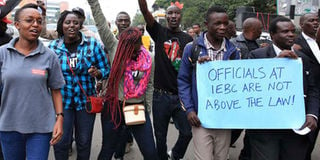Why it is not right to call for resilience if it translates to oppression

Members of Kura Yangu, Sauti Yangu civil society organisation, in Nairobi on September 13, 2017, protest against the conduct of the electoral agency during the presidential elections. Civil society members should not be intimidated. PHOTO | JEFF ANGOTE | NATION MEDIA GROUP
What you need to know:
- The ‘resilience agenda’ tends to focus on mediating the effects of inequality, rather than on trying to alleviate or eradicate them.
- Efforts to ‘build resilience’ should never replace people’s capacity to resist injustice and to demand alternative change.
It is increasingly common to hear people talk about resilience or, more specifically, the need to help people to become more resilient.
But what does this mean? And is this something that governments, international bodies, local organisations and communities should be seeking as a primary long-term goal?
In everyday parlance, resilience refers to the capacity to reshape, recover or bounce back.
However, in ‘development speak’ the term has taken on a more specific meaning.
In the words of the Inter-agency Resilience Working Group (IRWG), resilience refers to the “ability of countries, communities and households to anticipate, adapt to and/or recover from the effects of potentially hazardous occurrences … in a manner that protects livelihoods, accelerates and sustains recovery, and supports economic and social development”.
It is thus an approach that, in the words of the IRWG, “encourages people to be ready for change”.
CLIMATE CHANGE
In turn, the focus of resilience programmes is often on helping people to cope with, respond to and manage shocks – from droughts and floods to economic depressions and violent conflicts.
At one level, this is clearly a good thing. Shocks happen and one does not want a situation where people cannot cope or manage when they occur.
It is also clear that with climate change and deforestation, environmental shocks are likely to become more frequent and severe.
However, at another level, I find the current ‘resilience agenda’ inherently problematic.
My concern is, as Maria Kaika (a professor of Urban, Regional and Environmental Planning) has argued, that a focus on resilience ends up being an act of “immunology” with citizens and environments vaccinated “so that they can take larger doses of inequality and degradation in the future”.
VICTIMS
In other words, the ‘resilience agenda’ tends to focus on mediating the effects of inequality, rather than on trying to alleviate or eradicate them, and simultaneously runs the risk of dampening campaigns for transformation.
This concern set in around the time of the Truth, Justice and Reconciliation Commission (TJRC) when I would sometimes hear people comment on victim’s resilience.
To give one example: At the TJRC’s women’s hearing in Kericho in 2011, one woman spoke of how she had lost her husband during the post-election violence of 2007/8 and had broken her hand whilst running away from gunshots.
She emphasised how she had no father and her mother was far away; how there was no-one to help her and she did not have the strength to work because of her hand, but still had to care for her children; and requested any help from the government and thanked God “as you’ve come to listen to our cries”.
JUSTICE
Later on in the day there was a discussion about women’s resilience.
However, to cast this woman’s story – and others like it – as one of resilience seemed to miss the point.
In short, the woman’s story seemed to be one of survival or what historian John Lonsdale has called ‘agency in tight corners’.
In turn, to cast the woman’s story as an example of resilience seemed to constitute a failure to really listen.
It also threatened to silence her demands for justice in the sense of non-repetition and redress, since, if she were resilient and coping, perhaps talking about what had happened would be sufficient.
MEDIA SHUTDOWN
There are also many things that people should not become more resilient to, but which they should actively campaign against.
Examples from Kenya include the recent closing of media and civil society spaces and the frightening levels of extrajudicial killings.
In short, while I am not against building resilience in the sense of improving people’s capacity to cope with, respond to and manage shocks when they occur, such improvements should be seen as short-term mitigation measures that go hand-in-hand with efforts to minimise the number and scale of external shocks, and to simultaneously transform people’s experiences of those shocks that cannot be prevented.
At the same time, people should not be “ready for (every) change” and some should be actively resisted.
In turn, efforts to ‘build resilience’ should never replace, or be to the detriment of, people’s capacity to resist injustice and to demand alternative change.
Gabrielle Lynch is a Professor of Comparative Politics, University of Warwick, UK ([email protected]; @GabrielleLynch6)





